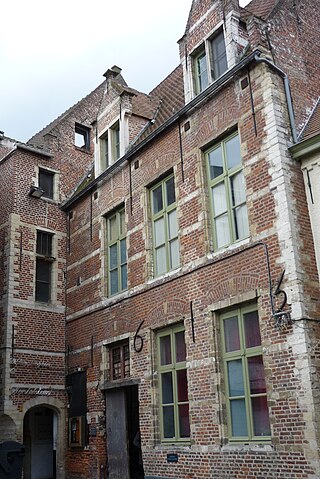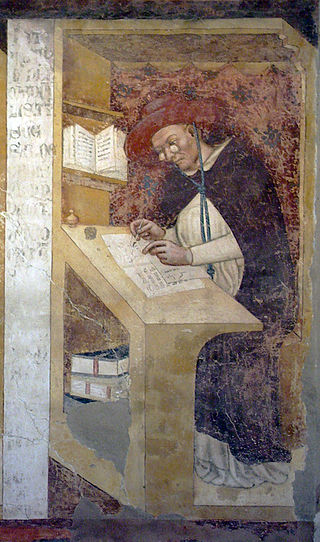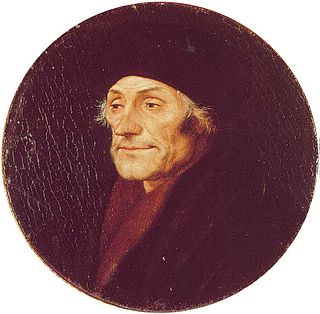
The Vulgate, sometimes referred to as the Latin Vulgate, is a late-4th-century Latin translation of the Bible.

Textus Receptus refers to the succession of printed editions of the Greek New Testament from Erasmus's Novum Instrumentum omne (1516) to the 1633 Elzevir edition.
Middle English Bible translations (1066-1500) covers the age of Middle English, beginning with the Norman conquest and ending about 1500.
Ad fontes is a Latin expression which means "[back] to the sources". The phrase epitomizes the renewed study of Greek and Latin classics in Renaissance humanism, subsequently extended to Biblical texts. The idea in both cases was that sound knowledge depends on the earliest and most fundamental sources.

The Collegium Trilingue, often also called Collegium trium linguarum, or, after its creator Collegium Buslidianum, is a university that was founded in 1517 under the patronage of the humanist, Hieronymus van Busleyden. The three languages taught were Latin, Greek and Hebrew. It was the model for the Collège de France founded in 1530. It is located in Leuven, Belgium.

Hugh of Saint-Cher, O.P. was a French Dominican friar who became a cardinal and noted biblical commentator.
Ian Theodor Beelen was a Dutch exegete and orientalist.

John Colgan, OFM, was an Irish Franciscan friar noted as a hagiographer and historian.

Aodh Mac Cathmhaoil, O.F.M., was an Irish Franciscan theologian and Archbishop of Armagh. He was known by Irish speakers at Leuven (Louvain) by the honorary name Aodh Mac Aingil, and it was under this title that he published the Irish work Scáthán Shacramuinte na hAthridhe.
Lancelotto Politi was an Italian Dominican canon lawyer, theologian and bishop.

Bible translations into Dutch have a history that goes back to the Middle Ages. The oldest extant Bible translations into the Dutch language date from the Middle Dutch (Diets) period.
Bible translations into French date back to the Medieval era. After a number of French Bible translations in the Middle Ages, the first printed translation of the Bible into French was the work of the French theologian Jacques Lefèvre d'Étaples in 1530 in Antwerp. This was substantially revised and improved in 1535 by Pierre Robert Olivétan. This Bible, in turn, became the basis of the first French Catholic Bible, published at Leuven in 1550, the work of Nicholas de Leuze and François de Larben. Finally, the Bible de Port-Royal, prepared by Antoine Lemaistre and his brother Louis Isaac Lemaistre, finished in 1695, achieved broad acceptance among both Catholics and Protestants. Jean-Frédéric Ostervald's version (1744) also enjoyed widespread popularity.

Novum Instrumentum Omne, later called Novum Testamentum Omne, was a bilingual Latin-Greek New Testament with substantial scholarly annotations, and the first printed New Testament of the Greek to be published. It was prepared by Desiderius Erasmus (1466–1536) and printed by Johann Froben (1460–1527) of Basel.

The Sixto-Clementine Vulgate or Clementine Vulgate is the edition promulgated in 1592 by Pope Clement VIII of the Vulgate—a 4th-century Latin translation of the Bible that was written largely by Jerome. It was the second edition of the Vulgate to be authorised by the Catholic Church, the first being the Sixtine Vulgate. The Sixto-Clementine Vulgate was used officially in the Catholic Church until 1979, when the Nova Vulgata was promulgated by Pope John Paul II.

The Old University of Leuven was established in 1425 with Faculties of Arts, Medicine, Law; however, the university did not have a Faculty of Theology initially. In 1426 a Faculty of Canon Law was added, and at that time both Law Faculties functioned together in one Collegium utriusque iuris.
The following is a timeline of the history of the municipality of Leuven, Belgium.

The Leuven Vulgate or Hentenian Bible was the first standardized edition of the Latin Vulgate, the official Bible of the Roman Catholic church. The Leuven Vulgate essentially served as the standard text of the Catholic Church from its publication in 1547 until the Sixtine Vulgate was published in 1590. The 1583 edition of the Leuven Vulgate is cited in the Oxford Vulgate New Testament, where it is designated by the siglumH.
Franciscus Lucas Brugensis or François Luc de Bruges (1548/9–1619) was a Roman Catholic biblical exegete and textual critic from the Habsburg Netherlands.
Johan Willemsz, latinized Johannes Harlemius (1538–1578), was a Dutch Jesuit and Hebraist from Haarlem who taught at the Jesuit house of studies in Leuven. He briefly taught Hebrew at the Collegium Trilingue (1567–1568). An expert on the Old Testament, he advised on both the Plantin Polyglot (1573) and Lucas Brugensis's revision of the Leuven Vulgate (1574).











